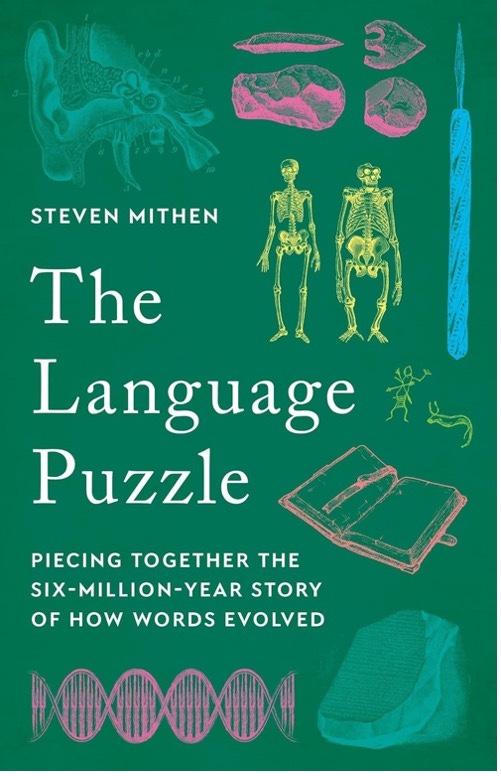Tl;dr – There’s a lot to love about this book. It goes in depth about the evolutionary science around language development – not just psychologically, but physiologically as well. Mithen challenges Pinker’s reining theory of language development, but I think the quibbles are actually minor.
Language development is a fascinating subject area. As my now 13-month-old twins are saying their first words, I find myself amazed as I listen to them try to morph their mouth, control their air, and form coherent sounds to communicate with me (right now, mostly saying “uh-oh” as they drop things). Within the next year, they will begin to experience an explosion of language as they learn hundreds of words. By the time they are five, they will be fluent in their native language.
But how does this happen? And why do we seem to be the only animals that have mastered abstract language in the ways that we have? In The Language Puzzle: Piecing Together the Six-Million-Year Story of How Words Evolved, Steven Mithen takes a deep dive into the physiology, evolution, and psychology of language.
There’s a lot to love about this book. It’s highly detailed and explicitly evolutionary in scope. He discusses the relationship between language and primate calls, challenges the theory that spoken language emerged from hand gestures, and the evolution of words and languages themselves.
Mithen’s basic theory is that language evolved from vocalizations, not hand gestures, citing evidence of animal communications having specific meanings that others understand. He also shows how the development of the vocal tract and mouth allowed for, or restricted, the range of sounds human ancestors were capable of making to piece together the constraints on language throughout human evolutionary history since our split with chimpanzee ancestors about six million years ago. He then goes into detail of how calls turned to iconic words and eventually to abstract words and metaphors that now dominate our language.
Now to the beef with Pinker. Pinker’s famous theory of language (that I learned in my college linguistics class and that I taught in my psychology courses) rests on the concept of “universal grammar” whereby our brains are “hardwired” to latch onto language using specialized evolved cognitive mechanisms in our brain. Mithen isn’t convinced. He argues that universal grammar doesn’t exists if you sample diverse languages across the world (e.g., no single grammatical aspect exists in all languages), and that language is learned through “general purpose” mechanisms throughout the brain.
As an evolutionary scholar, nothing grinds my gears more than the false and incomprehensible contrast of “learning” and “evolution”. I also disagree that his evidence against universal grammar is as strong as proposed (perhaps we can do some multivariate analysis instead…).
But, I like this beef honestly. It’s refreshing to hear new angles and approaches to things. It gives me something to sink into when explaining and discussing how language develops. The greatest strength and weakness of this book is its level of detail. I love it and hate it all at the same time. At points, I felt like I was back in my painfully dull undergraduate linguistics course with the level of detail I found myself in about syntax. But overall, I love that I can dive into each chapter to learn, in detail, about something very specific.
Will it replace Pinker’s The Language Instinct? Maybe, but Mithen’s theory needs some marketing work to compete in my opinion.
Published: June 2024
Publisher: Basic Books
Format: Hardcover
If you think this sounds interesting, bookmark these other great reads:
Eve: How the Female Body Drove 200 Million Years of Human Evolution (2023) by Cat Bohannon | Read my review
Exercised: Why Something We Never Evolved to Do Is Healthy and Rewarding (2021) by Daniel E. Liberman







Excellent analysis, thank you
I've had this book on my shelves for some time now. I really need to get to reading it. I'm surprised by the claim the language evolved from vocalizations first. As a long time Tomasello reader I thought the case for gestures first was quite strong. (Though I recall Scott-Philipps had some quibble with it).
And on the topic of Universal Grammar, have you read Heyes' critic in Cognitive Gadgets? I'd be interested to know what you think of it.
I also highly recommend Caleb Everett's A Myriad of Tongues